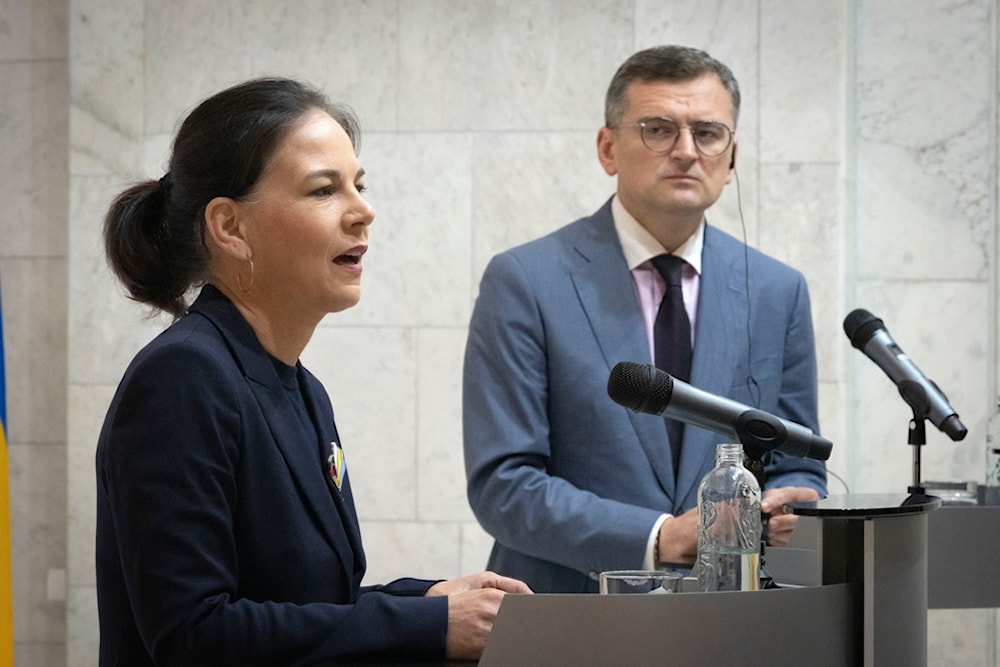Germany ‘not planning’ Palestine recognition
Germany’s top diplomat mentioned the necessity of a “political solution” to the crisis in the region before such recognition could be considered.
-
![German Foreign Minister Annalena Baerbock, left, and Ukrainian Foreign Minister Dmytro Kuleba answer media questions during their press conference in Kyiv, Ukraine, Tuesday, May 21, 2024. (AP)]()
German Foreign Minister Annalena Baerbock, left, and Ukrainian Foreign Minister Dmytro Kuleba answer media questions during their press conference in Kyiv, Ukraine, Tuesday, May 21, 2024. (AP)
German Foreign Minister Annalena Baerbock announced on Wednesday that Germany isn’t currently planning to recognize Palestine officially.
The diplomat mentioned the necessity of a “political solution” to the crisis in the region before such recognition could be considered.
Speaking at a joint press conference in Weimar alongside Polish Foreign Minister Radoslaw Sikorski and French Foreign Minister Stephane Sejourne, Baerbock stated, “If the recognition [of Palestine] could bring peace at the moment, then, I think, no politician, no person on Earth would have hesitated. But I have repeatedly said over these six months that in order to resolve this monstrous situation that we are now having to go through, we need a political solution, not a nominal recognition.”
Meanwhile, France echoed similar sentiments, with Foreign Minister Sejourne stating, “I do not think that the recognition [of Palestin] would make a contribution now… a diplomatic solution to the regional conflict. France has repeatedly clearly stated that it would like recognition to contribute to a political solution to the conflict, now is not such a moment.”
Read more: Palestinian factions praise Ireland, Spain, Norway’s state recognition
It is important to recall that as these events are unfolding, Germany is currently being sued by Nicaragua at the International Court of Justice for complicity in Israeli war crimes.
ICC’s Netanyahu arrest warrant creates diplomatic quandary for members
Earlier today, Reuters published an analysis detailing that International Criminal Court Prosecutor Karim Khan’s request for an arrest warrant against Israeli Prime Minister Benjamin Netanyahu has left key member states in a diplomatic dilemma over balancing support for both “Israel” and the ICC.
Khan’s unprecedented move, aiming to hold a sitting Western-backed leader accountable, awaits review by ICC judges. The request which focuses on war crimes and crimes against humanity during the Gaza genocide has raised questions among ICC backers about their loyalty.
While some capitals, including Paris, London, and Berlin, were informed beforehand about the arrest warrants, responses remain uncertain. German officials are for instance facing tensions between backing “Israel’s” security and supporting ICC independence.
The US has on its part condemned the move and rejected equivalence between Hamas and “Israel”. Senators in Congress have threatened to mobilize a team of lawyers to sanction the ICC. Nonetheless, European divisions on the matter have exposed wider disagreements over Palestinian statehood.
Read more: ‘Court built for Africa and thugs like Putin’: top officials told Khan
The UK which has been part of the ICC since 2001 has questioned the court’s jurisdiction, while Italy alleges potential antisemitism fueling. France advocates for ICC independence but stresses compliance with humanitarian law. Spain on its part has expressed support for the ICC’s investigation.
The ICC’s request raises concerns about limiting Netanyahu’s and Security Chief Gallant’s travel, but executing warrants relies on member states.
“It would be especially damaging if European countries fail to observe arrest warrants, as they have always been among the court’s most active supporters,” Anthony Dworkin, senior policy fellow at the European Council on Foreign Relations, told Reuters.

